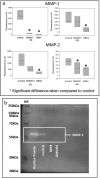Effects of MMP inhibitors incorporated within dental adhesives
- PMID: 22518030
- PMCID: PMC3706172
- DOI: 10.1177/0022034512446339
Effects of MMP inhibitors incorporated within dental adhesives
Abstract
Matrix metalloproteinase (MMP) inhibition has been shown to reduce adhesive bond degradation when applied as a pre-conditioner, adding to clinical steps in the placement of adhesives, but their incorporation within dental adhesives has not been fully explored. This study examined the effect of including 2 MMP inhibitors (BB94 and GM6001) within the primers of 3 commercially available adhesives. Fluorometric assay and zymography showed that adhesives with MMP inhibitors had high affinity toward both synthetic fluorogenic FRET peptides (95%) and dentin powder substrates, respectively. The immediate microtensile bond strength was enhanced for 2 types of adhesives following the addition of both inhibitors. However, no changes were detected between the control and the inhibitor groups following 3-month storage. The modified two-step etch-and-rinse and single-step systems showed less Rhodamine B penetration to the "hybrid layer" and to the "adhesive", respectively. The incorporation of BB94 and GM6001 within the primers resulted in the inhibition of dentin MMPs with improved initial bond strength and enhanced sealing ability.
Conflict of interest statement
The authors declare no potential conflicts of interest with respect to the authorship and/or publication of this article.
Figures



References
-
- Chaussain-Miller C, Fioretti F, Goldberg M, Menashi S. (2006). The role of matrix metalloproteinases (MMPs) in human caries. J Dent Res 85: 22-32 - PubMed
Publication types
MeSH terms
Substances
Grants and funding
LinkOut - more resources
Full Text Sources

